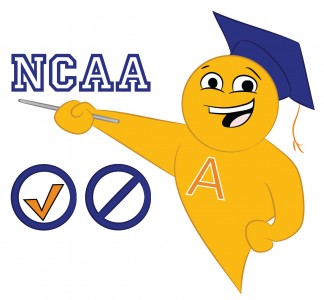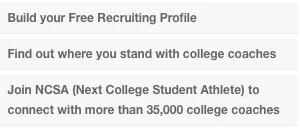5 Steps to a Killer Soccer Recruiting Resume
 Soccer recruiting starts earlier than almost any other college sport, making it imperative for athletes to start reaching out to coaches at a young age. Building a great soccer resume will help you introduce yourself to college coaches and help you get a leg up on the competition.
Soccer recruiting starts earlier than almost any other college sport, making it imperative for athletes to start reaching out to coaches at a young age. Building a great soccer resume will help you introduce yourself to college coaches and help you get a leg up on the competition.
Here are five tips in creating a great soccer resume:
1. Seeing a Player in Person is a Critical Component to Any College Coach’s Evaluation of a Student-athlete.
You must have a complete list of your game schedule. However, this isn’t going to get coaches to just start showing up to your game. Many coaches like to see a video of a player before they commit to making a visit to see them play in person. Make sure your coaches and/or your parents are filming your games. Put together a highlight film of your best soccer plays. Upload it to a video-hosting site such as YouTube and put the link in your resume. Also, be prepared with a full-game of footage, as some coaches may ask for one after they have viewed your highlight film.
2. It is Important to Accurately Show Your Physical Statistics
Tell coaches your height and weight. List your 40-yard dash times, both with and without the ball. Coaches may also want to know your one-mile time, and the results to your vertical jump and broad jump.
3. Depending on Which Position You Play, You Should Include Relevant Statistics
Offensive players should include games and minutes played, goals, goals per game, assists, shots, and total points. Goalies can show stats for games started, win/loss record, goals against, goals against average, shots on goal, saves, save percentage, and shutouts. One thing that is very important is to try and keep separate statistics for the different leagues you are playing in. Don’t group your stats from your high school team in with your stats from your travel team.
4. Another Critical Component in Soccer Recruiting is Summer Camps
If you are serious about playing college soccer, you will need to go to camps. Making contact with coaches before you attend camps is crucial because coaches scout athletes they are already familiar with at camps. Coaches usually do not discover new talent at soccer camps.
5. Highlight Your Strengths and Skills in the Cover Letter or Introduction to Your Resume
The introduction is your initial chance to sell yourself to a coach and explain why you would be a good fit for his or her program. Tell them about your playing history and experience and also about future events. Market yourself in a way that encourages coaches to want to evaluate you as a student-athlete.
Do you have any questions about how to write your soccer recruiting resume? Leave your questions in the comments section below or connect with us on Facebook, Twitter, or Google+!


